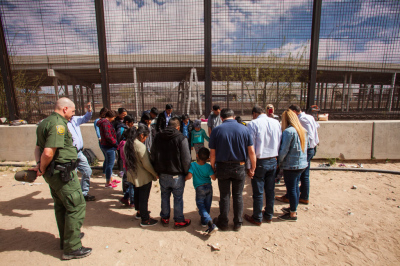The Bible and immigration: God's people and their long history of migration
Ever since ancient people groups from Asia crossed a land bridge near Alaska, America has been a land of immigrants. In fact, all of human history is the story of mass migrations across the planet.

But in the past several years, America has opened itself up to fewer and fewer immigrants. During this time, the Christian church in America has – for the most part – done little to oppose this diminishment in hospitality. In fact, certain sectors of the church have applauded it.
The God of Israel, however, puts a high premium on the care of immigrants. When we look closely at the Bible, we see a God who defines his church and his people by an ethic of care and welcome for the stranger, the foreigner and the refugee. For the church to truly be the church, we must put this ethic into practice in all we do.
Immigration is a crucial part of the Biblical story. Yahweh created his own people by means of three migrations. Abram moved his extended family from Ur to Canaan. Jacob moved his children and their large families to Egypt. And Moses brought this rapidly growing people group out of Egypt and back to Canaan. In fact, the defining event in the history of Israel was this mass migration from Egyptian slavery to the promised land of milk and honey.
Because the Hebrew people had a long history of immigration and because immigrants have always been a vulnerable population, the God of Israel was very clear about the importance of welcoming and protecting the alien and stranger. In the midst of Israel’s migration out of Egypt, God gave his people multiple, specific commands to protect the rights of immigrants.
One of these is in Deuteronomy 10:19, where God says, “So you also must love the foreigner, since you yourselves were foreigners in the land of Egypt.” Notice the reason given for God’s protection: Israel’s own history of living as a vulnerable group of immigrants. Israel knows what it feels like to live as a persecuted minority, so she herself must always protect communities in danger in her midst. The Bible reiterates this point in Exodus 23:9 when it says, “Do not oppress a foreign resident, since you yourselves know how it feels to be foreigners; for you were foreigners in the land of Egypt.”
The God of the Bible teaches an ethic of empathy, something sorely lacking in America today. In fact, empathy goes right to the heart of the character of God. Notice the three active verbs in this passage from Deuteronomy 10:17-18: “The LORD your God ... executes justice for the fatherless and widow. He loves the foreigner. He gives them food and clothing.” At the core of God’s being is an active and emotional commitment to care for those in need.
If, as Christians believe, the God of Israel became incarnate in the person of Jesus of Nazareth, and if, as Christians believe, Jesus rose from the dead and is seated at God’s right hand, then Christians also have good reason to be committed to the well-being of immigrants. Perhaps the most famous parable of Jesus is a critique of his own people's intolerant attitude towards immigrants. Jesus spotlights an immigrant, a despised loathsome Samaritan, as the unlikely hero of the story who shows extraordinary compassion to a wounded Israelite.
Indeed, at the core of the Christian identity is the idea that we are immigrants in this world. Peter addresses his people as “elect exiles” (1 Peter 1:1), and Peter encourages them to assume the identity of an immigrant, saying, “conduct yourselves with fear throughout the time of your exile” (1 Peter 1:17). No matter how comfortable a Christian gets within a certain culture, no matter how much cultural weight the church can throw around, Peter calls his brothers and sisters “aliens and strangers” (1 Peter 2:11).
In fact, the heart of the gospel is that the Son of God takes the form of an immigrant. Jesus Christ came to the world as a stranger who lived on the fringes of Jewish society and aided the most vulnerable and marginalized. The greatest motive of Christ’s life, the main reason that he came from heaven, was to rescue his angry and violent children from their own self-destructive exclusion.
Jesus was always an outsider. He was crucified outside the camp. Jesus also suffered outside the gate in order to sanctify the people through his own blood. “Therefore let us go to him outside the camp and bear the reproach he endured. For here we have no lasting city, but we seek the city that is to come” (Hebrews 13:12-14).
The Bible does not precisely prescribe any specific immigration policy, but its general thrust certainly would lead Christians to be pro-immigrant, guided by principles such as those advanced by the Evangelical Immigration Table. And regardless of whether or not our lawmakers take biblical principles into account as they legislate, the church’s role is clear: to love immigrants, emulating our God and remembering that our own identity is as “aliens and strangers” on earth. I hope Christians across the country will no longer be silent, and will instead embrace the ethic of empathy and care that is taught in the Bible.
Rev. Ben Milner is the senior teaching pastor at Salem Presbyterian Church in Winston-Salem, North Carolina, which is among many local churches that partner with World Relief to serve immigrants.




























